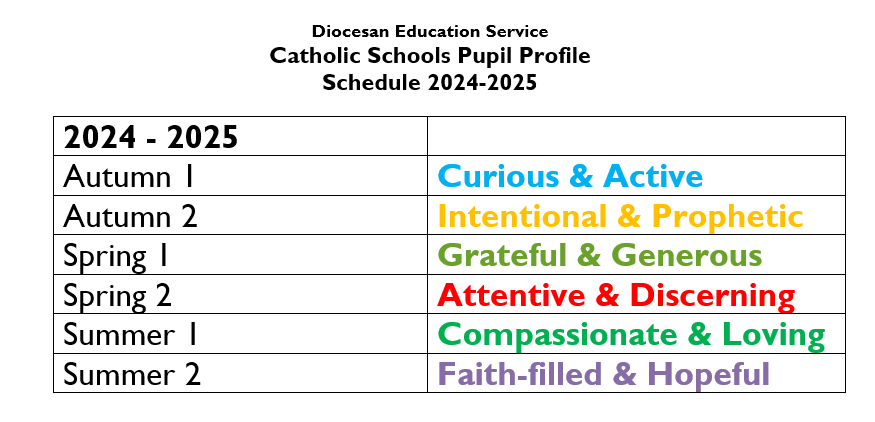Virtues and Values

Pope Benedict asked ‘What are the qualities you see in others that you would most like to have yourselves? What kind of person would you really like to be?’
The answer at Our Lady and St Benedict is that we all want to be the best person we can possibly be, inspired and led by the gospel values Jesus taught us. To help us achieve this we follow the Catholic Pupil Profile; known in school as ‘The Virtues’. These are influenced by St Ignatius who believed education to be a time for learning and a time for formation in learning to live a good life – living and learning a good life with Christ. Our Mission statement also reflects this:

The virtues and how they help us to grow into the person we want to be are listed in the table below.
|
Pupils in a school in the Archdiocese of Birmingham are growing to be … |
Schools in the Archdiocese of Birmingham help their pupils grow… |
|
Grateful for their own gifts, for the gift of other people, and for the blessings of each day; and generous with their gifts, now and in the future. |
By encouraging them to know and be grateful for all their gifts, developing them to the full so that they can be generous in the service of others. |
|
Attentive to their experience and to their vocation; and discerning about the choices they make and the effects of those choices. |
By promoting the practice of attentive reflection and discerning decision making: in teaching, in the examen, prayer and retreats; and through the practice and example of school leaders and staff. |
|
Compassionate towards others, near and far, especially the less fortunate; and loving by their just actions and forgiving words. |
By being compassionate and loving in the way pupils are treated, especially when a pupil is in trouble; and by opening pupils’ eyes to those who suffer poverty, injustice or violence. |
|
Faith-filled in their beliefs and hopeful for the future. |
By passing on the living and faith-filled tradition of Jesus Christ; by having persevering faith in the pupils, and by encouraging them in turn, to have faith and hope in themselves and others. |
|
Eloquent and truthful in what they say of themselves, the relations between people, and the world. |
By developing an eloquent language which pupils can use to understand and articulate their emotions, beliefs, and questions, encouraged by the example of their teachers to be truthful in the way they represent themselves and speak about the world. |
|
Learned, finding God in all things; and wise in the ways they use their learning for the common good. |
By the breadth and depth of the curriculum; by excellence of teaching, and the creation of opportunities to become more learned and wise. |
|
Curious about everything; and active in their engagement with the world, changing what they can for the better. |
By leading pupils to be curious about the universe and all human activity, and to take increasing responsibility for their own learning. |
Each half term we study and try to apply two virtues. This academic year we are following the following virtues:
Virtues table for academic year 2024 - 2025



